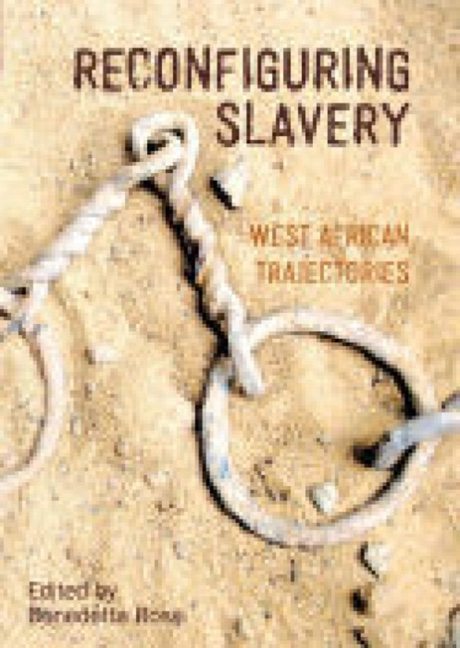Book contents
- Frontmatter
- Content
- List of Figures
- Notes on Contributors
- Preface
- A Note on Language
- Preface to the Second Edition
- 1 Introduction: Rethinking Slavery in West Africa
- 2 Slave Descent and Social Status in Sahara and Sudan
- 3 African American Psychologists, the Atlantic Slave Trade and Ghana: A History of the Present
- 4 After Abolition: Metaphors of Slavery in the Political History of the Gambia
- 5 Islamic Patronage and Republican Emancipation: The Slaves of the Almaami in the Senegal River Valley
- 6 Curse and Blessing: On Post-slavery Modes of Perception and Agency in Benin
- 7 Contemporary Trajectories of Slavery in Haalpulaar Society (Mauritania)
- 8 Slavery and Politics: Stigma, Decentralisation and Political Representation in Niger and Benin
- 9 Slavery and Migration: Social and Physical Mobility in Ader (Niger)
- 10 Discourses on Slavery: Reflections on Forty Years of Research
- Glossary of Foreign Words
- Index
6 - Curse and Blessing: On Post-slavery Modes of Perception and Agency in Benin
- Frontmatter
- Content
- List of Figures
- Notes on Contributors
- Preface
- A Note on Language
- Preface to the Second Edition
- 1 Introduction: Rethinking Slavery in West Africa
- 2 Slave Descent and Social Status in Sahara and Sudan
- 3 African American Psychologists, the Atlantic Slave Trade and Ghana: A History of the Present
- 4 After Abolition: Metaphors of Slavery in the Political History of the Gambia
- 5 Islamic Patronage and Republican Emancipation: The Slaves of the Almaami in the Senegal River Valley
- 6 Curse and Blessing: On Post-slavery Modes of Perception and Agency in Benin
- 7 Contemporary Trajectories of Slavery in Haalpulaar Society (Mauritania)
- 8 Slavery and Politics: Stigma, Decentralisation and Political Representation in Niger and Benin
- 9 Slavery and Migration: Social and Physical Mobility in Ader (Niger)
- 10 Discourses on Slavery: Reflections on Forty Years of Research
- Glossary of Foreign Words
- Index
Summary
The process of democratisation that Benin embarked upon in the 1990s, and similar political developments in Niger, Mali and lately Mauritania, ushered in the active participation of communities of slave descent in new modes of local politics. Former slave communities are now claiming their rights through non-governmental platforms and organisations, employing Western human rights discourses. In such contexts research on slavery must, on the one hand, contribute to overcoming biases and enabling former slaves to be perceived as legitimate political actors. On the other hand, it should not dismiss the fact that the ex-slaves’ ideological attachment to the communities of former masters may well prove stronger than the resentment for their past economic and political subjugation.
This is the case of the GannunkeeBe, a Muslim community living in the two provinces of Borgu and Atakora in Northern Benin. Being Fulfulde speakers, the GannunkeeBe have until recently been considered part of the larger FulBe society. However, in the 1994 census (and this itself can be seen as an indication of the ongoing process of ethnicisation) they became listed under the separate ethnonym ‘Gando’, although some of them would have preferred being classified as ‘FulBe’, as today the term ‘Gando’ implies former slave status in the history of Borgu.
‘Gando’ is employed, in French, with much broader connotations than its Fulfulde equivalent, ‘GannunkeeBe’. It is used as an umbrella term, referring both historically to the slaves of the Bariba and the FulBe, and to their present descendants. The equation of ‘Gando’ with slaves or ex-slaves is not only widespread in people's perceptions in South Benin, but it also figures in parts of Borgu, particularly among the younger generations who are no longer aware of subtle lexical nuances. From the point of view of the GannunkeeBe, however, this equation is based on a false generalisation. Just as Fulfulde language unites the FulBe and the GannunkeeBe and makes them appear as one single ethnic group to outsiders, the fact that all GannunkeeBe speak Fulfulde also erases status differences among them: not all of today's GannunkeeBe are of slave descent. Yet speaking Fulfulde and not being FulBe makes all GannunkeeBe appear to be descendants of slaves.
- Type
- Chapter
- Information
- Reconfiguring SlaveryWest African Trajectories, pp. 116 - 139Publisher: Liverpool University PressPrint publication year: 2009



